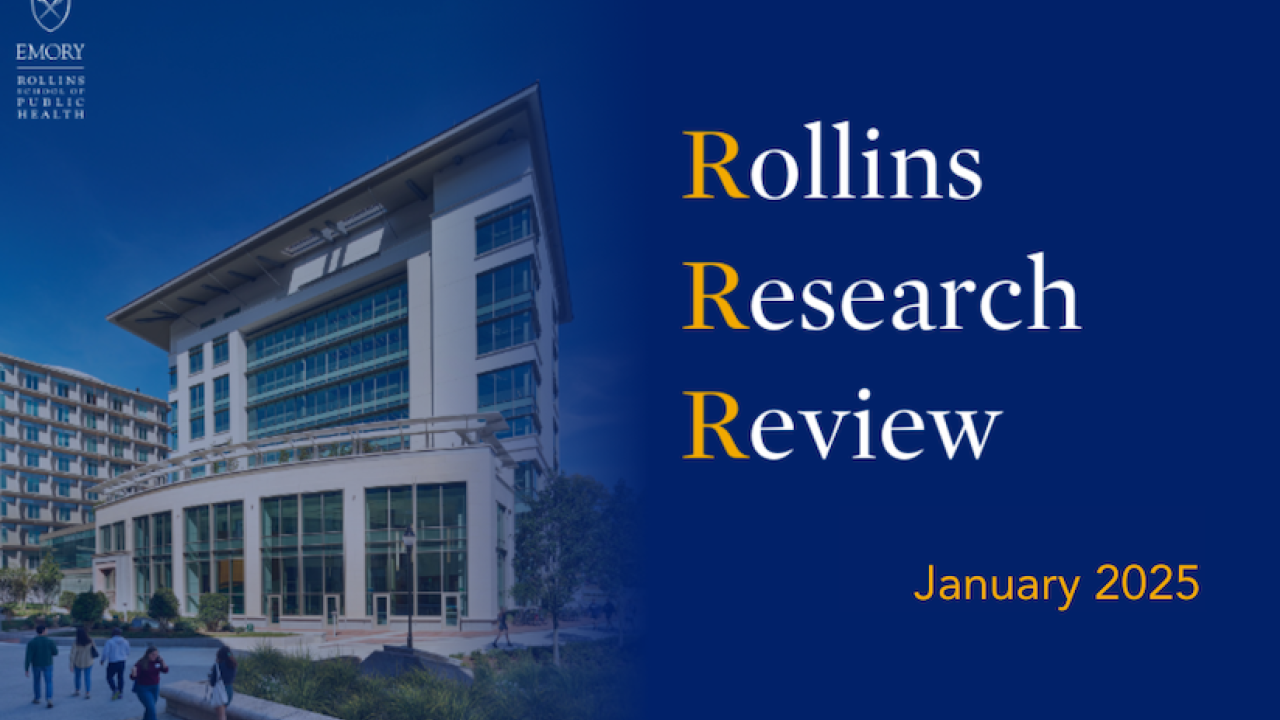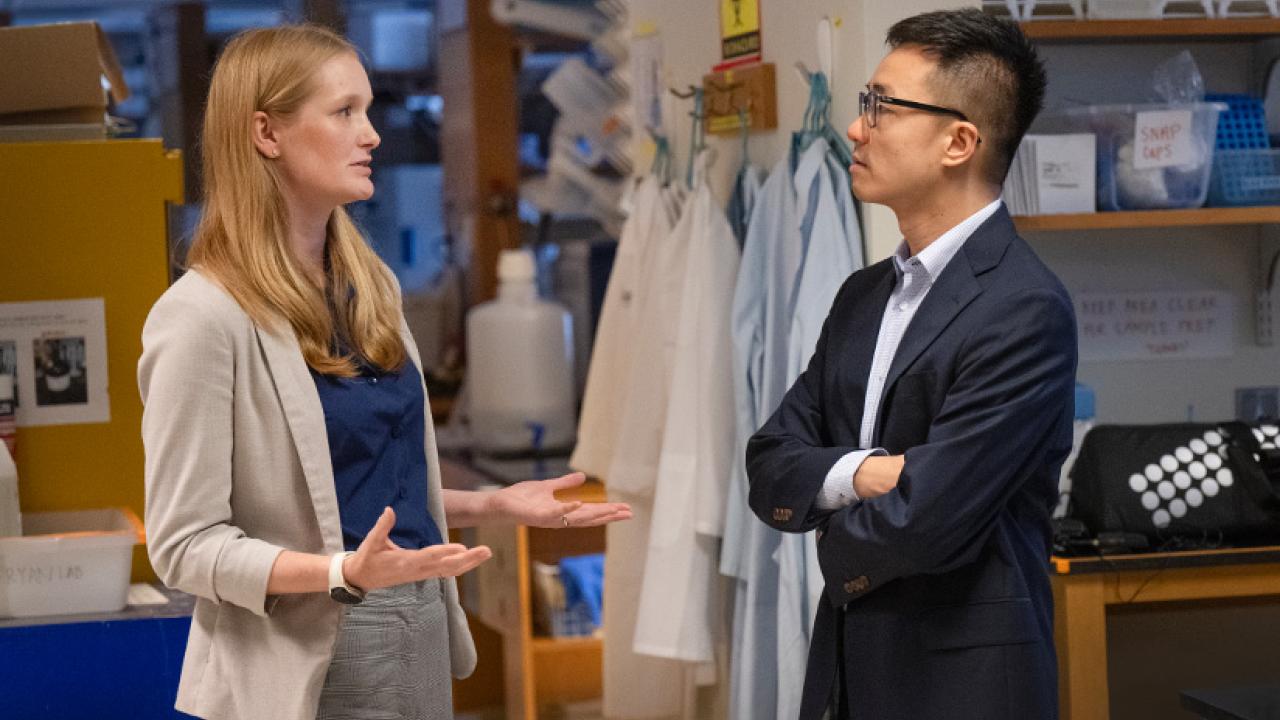Health Wanted: Aging
HEALTH WANTED, a weekly radio show and podcast produced in partnership with WABE, brings need-to-know public health headlines and breaks down the science behind trending topics.

The Episode
The topic: Lifespans have increased significantly in the past century, and while plastic surgery and eye cream may slow the visible effects of aging, getting older is both an inevitable and natural stage of life. This week on Health Wanted, host Laurel Bristow talks with Regina Shih, PhD, professor of epidemiology, about ensuring quality care and support for aging adults in the U.S.
The takeaway: Aging is a universal experience, but exactly how we age and what can be done to slow it down remains unclear. While advances in public health and medicine have extended our lifespans, age-related health issues and a lack of support and care for aging populations remain common problems.
- From dietary supplements to cosmetic procedures, the pursuit of looking younger fuels a $62 billion anti-aging industry. However, many anti-aging products contain strong chemicals that could be harmful, and anti-aging procedures can be dangerous if proper techniques are not used.
- On a scientific level, aging occurs as cells build up damage and the body’s ability to repair them declines. As our DNA is replicated in cellular reproduction, its packaging slowly wears down until it is no longer of good enough quality to copy. Additionally, cells lose the ability to produce energy over time, which limits their function.
- Environmental exposures like air pollution can affect gene function, increasing the risk of diseases like Alzheimer’s. Genetic mutations from DNA replication errors and environmental damage accumulate over time and impact cell function. Studies show that younger generations may experience faster biological aging, raising concerns about increased cancer risks.
- The U.S. Food and Drug Administration doesn’t classify aging as a disease, which complicates research and development of drugs to combat it. Advances like immune system boosting in mice may suggest future breakthroughs, but lifestyle habits remain the best defense against age-related health issues for now.
The Interview
The guest: Regina Shih, PhD
The key takeaways:
- There is a critical shortage of family and formal caregivers in the United States, which leaves millions of older adults needing support as they age. Family caregivers are usually unpaid and face financial and emotional challenges from taking on unexpected caregiving roles. Formal care settings and care organizations, also experience staffing shortages, increasing the pressure on families to provide care for aging family members.
- Some families hire caregivers from outside of regulated organizations to care for aging relatives. This offers better flexibility and is often more affordable, but it can also expose workers to risks of exploitation, and the workers may be underqualified for caregiving roles.
- Community-based programs such as senior centers offer valuable services like transportation and social support for older adults as they age, but some areas do not have these options. Existing government programs could improve with increased reach and structure.
- Individuals and families should start to plan early for long-term care needs, including decisions about care settings and financial strategies. Planning ahead and having difficult conversations about the aging process can help to smooth transitions and prepare families for the future.
The Listener Questions
Should I be worried about the seven cases of West Nile virus in Atlanta?
Seven cases of West Nile virus in Fulton County is not cause for alarm, but it is cause to remember to wear bug spray!
Most West Nile virus cases occur in August and September. During the summer when mosquitoes are circulating, they acquire West Nile virus if they bite an animal that has the disease, and then they infect another animal. Over the summer, the virus replicates in that second animal. Towards the end of summer, more mosquitoes feed on the newly infected animal and can be infected themselves and then pass the virus on to people.
West Nile virus amplifies in animal hosts over summer and then as more mosquitoes get it, it is more statistically likely that enough cases will occur in people that a few develop symptoms. 80% of cases of West Nile virus are asymptomatic.
Now, we could also start seeing more cases over time because global warming is increasing how long it stays warm. This means mosquito season could last longer, allowing for more bites and disease transmissions. But in 2018 we had nine cases in Fulton County, so seven really isn’t that remarkable.
I did not realize there was a boil water advisory and I drank tap water. Will I get sick?
Boil water advisories are issued when pipes lose pressure or have a water main break because that means there might be contaminants in the water. It doesn’t mean there are, it just means there might be.
If the water municipality detected something bad in the water, like E. coli, that would be tier one public notice, which means they have to tell everyone as soon as possible.
So, you are probably fine. Things would need to be pretty contaminated for you to get sick, and if they lifted the boil advisory that means they didn’t find anything in the water when they tested it.
Catch all the listener questions and Laurel’s answers on the full episode of Health Wanted by:
- Streaming at wabe.org or the WABE app
- Subscribing on Apple or Spotify
- Watching on WABE's YouTube channel
Show Notes
Want to dive deeper into this week's topic? Find Laurel's sources here.
- Aging and Wisdom: Culture Matters
- Age Advantages in Emotional Experience Persist Even Under Threat From the COVID-19 Pandemic
- Emotion dynamics across adulthood in everyday life: Older adults are more emotionally stable and better at regulating desires.
- With Age Comes Wisdom: Decision Making in Younger and Older Adults
- Tech CEO defends using his 17-year-old son’s blood plasma in pursuit of youth, despite it not working
- Life's Essential 8
- Despite Pandemic, Percentage of Older Adults Who Want to Age in Place Stays Steady
- Occupations with the most job growth
- Fact Sheet: Aging in the United States
- A shortage of health aides is forcing out those who wish to get care at home
- Medicare’s proposal on nursing home staff is ‘insanity,’ key expert says
- ‘Neither of us feel interested’: More Americans don’t want kids, and it’s not just because of the money
- Classifying aging as a disease could speed FDA drug approvals
- ‘Vampire facials’ were linked to cases of HIV. Here’s what to know about the beauty treatment
- Why Do We Age? Scientists Are Figuring It Out.
- Mitochondrial DNA leakage triggers inflammation in age-related cardiovascular diseases
- Differential DNA methylation in the brain as potential mediator of the association between traffic-related PM2.5 and neuropathology markers of Alzheimer's disease
- Somatic mutations in aging, cancer and neurodegeneration
- Cancer is rising among the young. Study suggests it’s because their cells are aging faster
- Life expectancy rise in rich countries slows down: why discovery took 30 years to prove
- Borrowing an idea from cancer immunotherapy, scientists make old-mice immune systems youthful again


